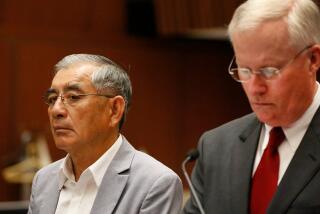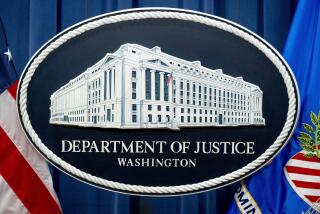8 Indicted in South Korea Probe
- Share via
SEOUL -- It has all the elements of an intriguing political scandal: offshore bank accounts, a mysterious burglary and presidential aides skulking about in the night. And like the true classics of the genre, this scandal is likely to leave an indelible mark on how a nation views its history.
The case revolves around surreptitious payments of $500 million made by a South Korean company to North Korea just days before a landmark 2000 summit between leaders of the estranged Koreas, one of the happiest moments in recent decades on the Korean peninsula.
But South Korean special prosecutor Song Doo Hwan wrapped up his probe Wednesday of the so-called cash-for-summit scandal with the conclusion that at least a portion of the money was to used to grease the wheels with the balky North Koreans.
The special prosecutor also announced that he was indicting eight people in connection with the payments, among them former top government officials and the chairman of Hyundai Asan, one of South Korea’s most important companies.
“Politically motivated government aid for the North,” is how Song characterized the payment, stopping just short of calling it a bribe, as conservatives have.
Speaking at a news conference in Seoul on Wednesday, Song also accused then-South Korean President Kim Dae Jung’s government of “active involvement in the transfers of the money, keeping them secret from the people and failing to go through a justifiable procedure for sending the money.”
Kim won the Nobel Peace Prize for the summit and for his acclaimed “sunshine policy” of dialogue with North Korea. But South Korean conservatives point to the illegal payments along with North Korea’s renewed nuclear ambitions as evidence that the entire reconciliation was a fraud.
“The summit has lost its moral foundation. Most Koreans now believe that the sunshine policy was based on bribery,” said Lee Dong Bok, a former assemblyman and an outspoken critic of the sunshine policy.
Days before the June 13-15 summit in 2000, the Hyundai Asan Corp. received a government loan of about $500 million that was in turn sent to North Korea, mostly through Macao.
Some of the money was Hyundai’s payment for development rights to a resort at the North’s Mt. Kumgang and for an industrial park near the demilitarized zone. But the prosecutor said he could not account for the purpose of about $100 million, which he concluded was “related to the summit.”
Those who are being indicted include the chairman of Hyundai Asan, Chung Mong Hun; Kim Dae Jung’s former intelligence director, Lim Dong Won; and Park Jie Won, a former minister of culture and tourism.
But the charges for most of the suspects are for fairly minor offenses, for example, violations of a law requiring government approval for any donations of aid to North Korea.
Park was also charged with abuse of power and obstruction of public business.
The biggest mystery is exactly what happened to the money. Many people in South Korea believe that it went to North Korean leader Kim Jong Il’s private slush funds, while others suspect more ominously that it went to pay for weaponry that could eventually be used against South Korea.
Another twist emerged this week when it was revealed that as much as $8 million of the money might have been stolen from the home of an arms dealer who had been asked to launder money on behalf of a presidential aide.
The South Korean opposition Wednesday introduced legislation seeking to continue the inquiry. The prosecutor’s term expired Wednesday, and President Roh Moo Hyun has opposed extending it. That term has led to charges of a cover-up -- adding yet another essential element to any classic political scandal.
More to Read
Sign up for Essential California
The most important California stories and recommendations in your inbox every morning.
You may occasionally receive promotional content from the Los Angeles Times.













